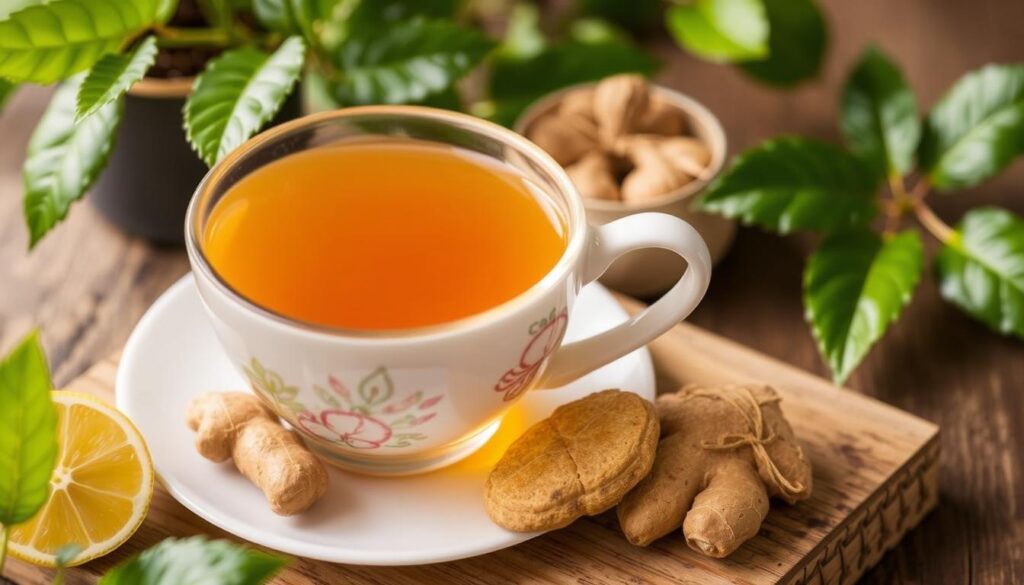Menstrual discomfort is a common experience for many women, and finding natural ways to ease the pain can make a significant difference in daily life. One popular remedy is ginger tea for periods—a soothing, aromatic beverage known for its powerful anti-inflammatory properties and its ability to alleviate menstrual symptoms. In this blog post, we’ll explore the benefits of ginger tea for periods, learn how to prepare it correctly, discuss potential downsides, and look at lifestyle choices that can further enhance its effects.
The Menstrual Health Benefits of Ginger Tea
Reducing Pain Severity
Ginger has been used for centuries as a natural pain reliever. Its warming properties help to relax the muscles and reduce tension, which can be particularly beneficial during menstrual cramps. By soothing the uterine muscles, ginger tea may help lessen the intensity of pain, offering relief without the need for stronger medications.
Decreasing Duration of Cramps
In addition to reducing the intensity of cramps, some studies suggest that ginger tea can help decrease the overall duration of menstrual discomfort. This means that not only might you experience less severe pain, but your cramps may also subside more quickly. Incorporating ginger tea into your daily routine during your menstrual cycle could provide a gentle, yet effective way to manage symptoms.
Anti-inflammatory Properties
Ginger contains potent anti-inflammatory compounds such as gingerol and shogaol, which help combat inflammation in the body. Since menstrual pain is partly caused by the release of inflammatory substances in the uterine lining, the anti-inflammatory effects of ginger can be especially helpful in reducing both pain and swelling during menstruation.
How to Prepare Ginger Tea
The benefits of ginger tea in periods,can be best unlocked when it’s prepared correctly. Here’s a guide to making a perfect cup of ginger tea.
Fresh Ginger vs. Dried Ginger
- Fresh Ginger: Fresh ginger root offers a vibrant, robust flavor and may contain higher levels of beneficial compounds. It’s ideal for those who prefer a stronger, fresher taste.
- Dried Ginger: Dried ginger, often available in powdered form, is a convenient alternative. While the flavor may be slightly milder, it still provides significant health benefits.
Recommended Brewing Techniques
- Peel and Slice: If you’re using fresh ginger, peel the skin and slice it into thin pieces. A general guideline is about one teaspoon of fresh ginger per cup of water.
- Boil: Bring water to a boil, then add the ginger slices. Let it simmer for about 10–15 minutes to extract the active compounds.
- Strain and Serve: Strain the tea into a cup to remove the ginger pieces.
For dried ginger, simply add a half teaspoon of powder to boiling water, stir well, and let it steep for 5–10 minutes.
Ideal Serving Suggestions
- Add a Natural Sweetener: Honey or maple syrup can enhance the taste while adding soothing properties.
- A Dash of Lemon: A squeeze of lemon not only complements the spicy notes of ginger but also adds vitamin C and aids in digestion.
- Enjoy Warm: Drinking ginger tea warm can help maximize its calming and anti-inflammatory benefits.
Potential Downsides of Ginger Tea
While ginger tea is generally safe for most people, it’s important to be aware of potential downsides and interactions.
Possible Side Effects
- Gastrointestinal Upset: Some individuals may experience mild heartburn or stomach discomfort if they consume too much ginger.
- Allergic Reactions: Although rare, allergic reactions can occur. It’s advisable to start with a small amount if you’ve never tried ginger tea before.
Interactions with Medications
Ginger may interact with certain medications, such as blood thinners or medications for high blood pressure. Always consult with your healthcare provider before adding ginger tea to your routine if you are on medication.
Recommendations for Safe Consumption
- Moderation is Key: Limit your intake to 1–2 cups per day during your menstrual cycle.
- Consult Healthcare Professionals: If you have any underlying health conditions or are pregnant, seek medical advice before incorporating ginger tea into your regimen.
Lifestyle Choices to Enhance the Effects of Ginger Tea
While ginger tea can be a powerful natural remedy, pairing it with a healthy lifestyle can further improve menstrual health.

Dietary Modifications
Focus on a balanced diet rich in whole foods, fruits, vegetables, and lean proteins. Reducing processed foods and refined sugars can help minimize inflammation, complementing the benefits of ginger tea.
Stress Management Techniques
Stress can exacerbate menstrual symptoms. Incorporate stress-reducing practices such as meditation, deep breathing exercises, or yoga into your daily routine. These techniques not only help manage pain but also improve overall well-being.
Regular Exercise and Its Benefits
Engaging in regular physical activity, even if it’s just a gentle walk, can boost circulation and reduce cramping. Exercise helps release endorphins—natural painkillers that improve mood and reduce discomfort.
Conclusion
Ginger tea stands out as a natural, effective remedy for easing menstrual discomfort. Its ability to reduce pain severity, decrease the duration of cramps, and combat inflammation makes it a worthwhile addition to your menstrual care routine. By preparing your tea correctly, exploring complementary herbal blends, and pairing your tea with healthy lifestyle choices, you can enhance its benefits and promote overall menstrual well-being. As with any remedy, moderation and professional advice are key to ensuring a safe and beneficial experience.
Enjoy your journey towards a more comfortable and balanced menstrual cycle—one soothing cup of ginger tea at a time.
With TaazaChai..



